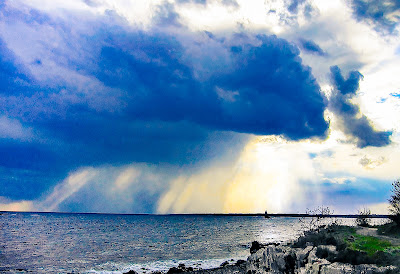 |
Approaching Storm CC Jean Stimmell, Fort Foster Kittery, Maine: 2013 |
No wonder we are beside ourselves, confronting a whole menagerie of 800-pound gorillas: the never-ending Covid pandemic, impending war with Russia, climate change disaster, and fundamental challenges to our democracy, just to name a few. When subjected to this never-ending horror show, our first instinct is to stick our heads in the sand.
No one likes doomsday tales, especially me – and I try not to write them. Still, it is imperative to acknowledge the enormity of what we are facing so we can make necessary adjustments. While it is society's task to reduce greenhouse gases, provide vaccines against Covid-19, and deal with other dangers of that ilk, it is our role as individuals to acknowledge we are entering uncharted territory that require course corrections.
Professor and author Timothy Morton calls these looming perils, bigger than human beings can comprehend, ‘hyperobjects.’ He says the first step in conquering our fear is admitting that these threats are real. By doing so, rather than paralysis, we will find catharsis. "Our sense of “the world” might be ending, but humans are not doomed. In fact, the end of this limited notion of the world may also be the only thing that can save us from ourselves.”1
He writes that learning to cope with these momentous perils will force us to move beyond our individualistic society, which “alienates us from each other and leave us ill-prepared to cope with hyperobjects.” Instead, we will discover that our fates and our suffering are defined in large part “by invisible, systemic forces pressing down upon us.” Out of that crucible, Morton concludes, ‘We’re being born now’—standing on the precipice not of becoming post-human, but of becoming truly human for the first time”.2
As a former psychotherapist, the last thing I want is to cause pain. That's why I have been transitioning my columns from being a Paul Revere, calling out the alarm, to a stance more philosophical and therapeutic. My writing now is more directed toward how we can achieve the most out of our lives during these trying times. I frequently cite the Tao Te Ching written by Lao-Tzu in the 4th or 5th century BC and Michel de Montaigne's essays, published in 1580. Despite living through periods of chaos and terror far worse than our own, both men offer timeless wisdom on how to live satisfying and meaningful lives.
I have also been transformed by reading Buddhist authors, like Jon Aaron, on ways to go with the flow. Now, when stressed, I recite 'embrace uncertainty' like a mantra; it lifts from my shoulders the dead weight of all those things I can't control, flooding me with a sense of serenity, similar, I think, to what long-term AA members get from reciting 'Let go, let God.'
Kaira Jewel Lingo, who worked closely with the venerable Thich Nhat Hanh, practices a similar approach in her personal life: “By slowing down, by choosing to rest back into the uncertainty rather than fighting it, I was able to touch into a sense of space, precisely in moments when it felt like there was no way to keep going and I would be totally overwhelmed.”3
I will close by quoting Lingo, who, while not sugarcoating the magnitude of what is rushing madly toward us, explains, once again, why we must surrender to the process to come out the other side:
“In a sense, our culture, our society is dissolving. We are collectively entering the chrysalis: structures we have come to rely on and identify with are breaking down, and we don’t know what the next phase will be like. We are in the cocoon. Learning to surrender in our own lives is essential to our collective learning to move through this time of faster and faster change.”4
xxx
1 https://www.wired.com/story/timothy-morton-hyperobjects-all-the-way-down/
2 Ibid.
4 Ibid.
No comments:
Post a Comment